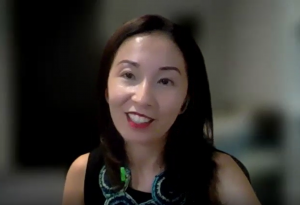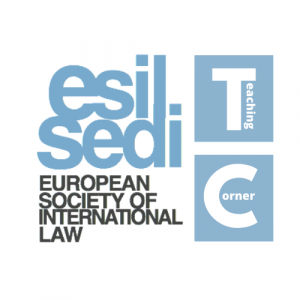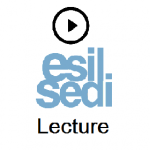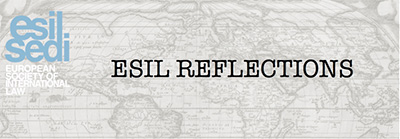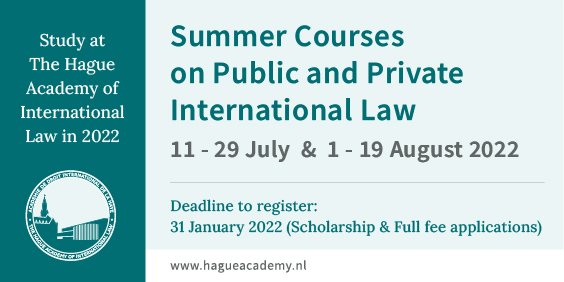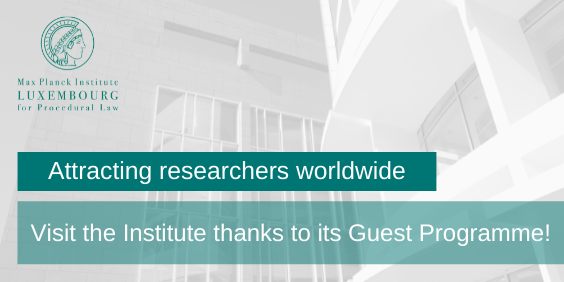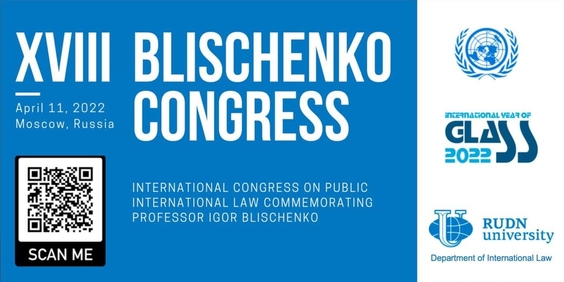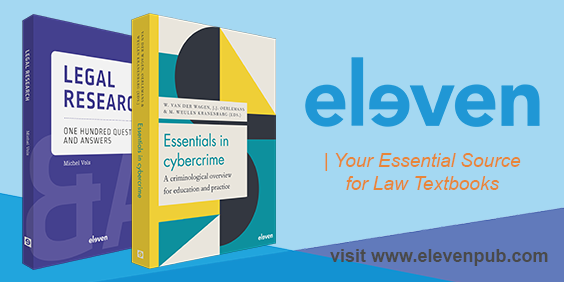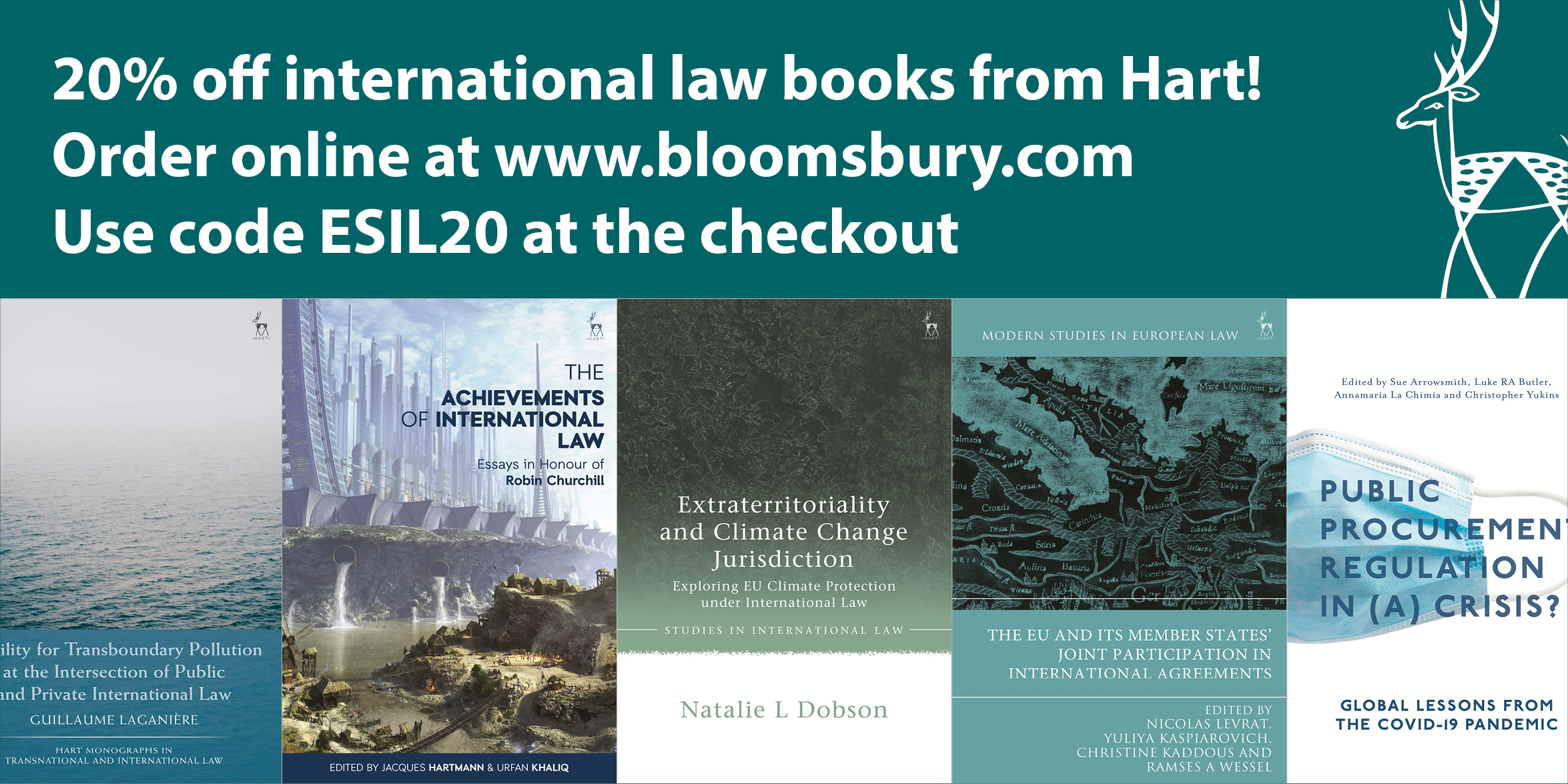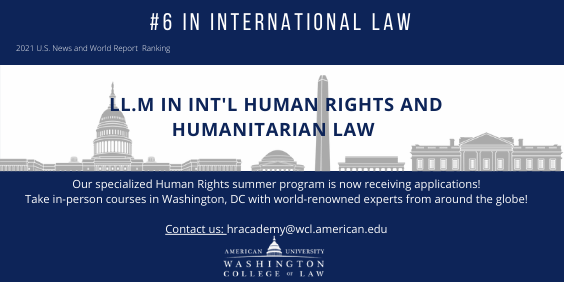ESIL Newsletter – Winter 2022
Editor: Sandrine Maljean-Dubois (University of Aix-Marseille)
 In this issue
In this issue
1. Message of the President

Dear ESIL Members,
A pragmatic way to start a new year is to fill one’s own calendar with dates of forthcoming events.
As far as ESIL is concerned, the highlight of our activities – if not the very raison d’être of our society – is our Annual Conference: if you’ve not done it yet, please pencil “ESIL Utrecht” on 1-3 September in your diary and make sure to register online as we get closer to our annual gathering.
Throughout the year, ESIL Interest Groups meet and organize workshops that are also the life and blood of our Society. For instance, on 17-18 March 2022, the ESIL IG on the European and International Rule of Law and the IG on the EU as a Global Actor will hold a joint conference with the University of Granada on Enhancing the Rule of Law in the EU’s External Action.
ESIL’s Research Forum will take place in Glasgow on 31 March – 1 April. The unique format of our research forums makes them a very friendly and engaging event: do consider attending even if you’re not a speaker! The Research Forum is also an opportunity for Interest Groups to meet – check the programme and our website for more on this.
A short week after the Research Forum, our traditional Joint Symposium with the Court of Justice of the European Union will be held in Luxembourg on 8 April, on EU Autonomy and International Law.
More dates and more events will be added throughout the year and you will of course be duly informed. Many events, workshops and conferences are now taking place online or in hybrid format which allows for a wider, more flexible and greener participation. Even if some “zoom fatigue” may result from our new online lives that the pandemic has imposed upon us, those formats are here to stay and ESIL will do its best to promote a sustainable way of holding academic conferences.
The Society is there to serve its members, but it would not exist without members: let me take this opportunity to ask you to make sure to renew your membership and eventually consider a 5-year or even a lifetime membership.
In the name of our Society, I thank you warmly for your continued support and participation and wish you all a happy, healthy and fruitful 2022.
Pierre d’Argent
ESIL President
2. Guest Editorial – Soft Codification and Hard Law
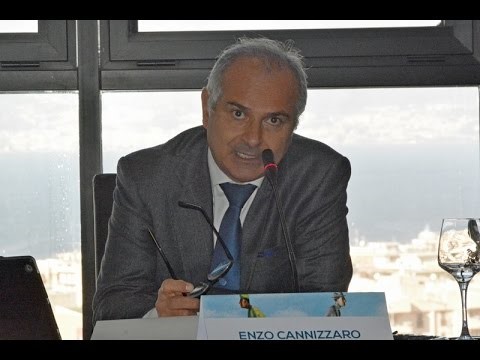 Enzo Cannizzaro
Enzo Cannizzaro
In its Comments on the draft Conclusions on peremptory norms of international law, the United States raised concerns as to the “clear and readily observable” tendency of the International Law Commission (ILC) to use conclusions, principles or guidelines instead of the traditional working method based on draft articles. Whereas this latter technique entails the transformation of general unwritten law into treaties, these new techniques simply constitute an opinion, though particularly qualified, of what the law is. It does not seem inappropriate to label them as ‘soft codification’.
The US Comments reflect a widespread concern, namely that soft codification is an insidious technique since it circumvents the principle which requires that States must consent to new law or, at least, acknowledge it. But is that true? Is it true that soft codification is a Trojan horse capable of entering the fortified citadel in disguise and producing new law in spite of the strict guardianship of the States?
I believe it is not.
Soft codification is, admittedly, a merely intellectual exercise, which, nonetheless, has the capacity to set in motion a process of development of the law. But this capacity is also possessed by hard codification, namely by draft Articles designed to be transformed into treaty provisions. Even if initially based on States’ consent, codification treaties can have far-reaching implications, well beyond the intentions of its parties. The entire history of codification proves that the development of international law does not depend on the technique of codification used but rather on its capacity to understand the emerging needs of the international community and to assert itself as general law.
Jus cogens is an excellent example of this transformation. The notion of jus cogens originates from the draft Articles on the law of treaties adopted by the ILC in 1966 and was ultimately incorporated in the 1969 Vienna Convention. In spite of the radical opposition of powerful States, it soon influenced international practice and is nowadays almost universally considered as a notion of general law. This trajectory proves that even the States’ control of the process of codification can be unable to stop the evolution of the law.
However, and paradoxically, soft codification can also be used as a tool to produce the opposite result: namely, to freeze the development of international law or even to prompt its regressive development.
Again, the history of jus cogens provides a good example. As is well known, Art. 41 of the Articles on State Responsibility laid down some legal consequences of serious breaches of jus cogens. This provision, albeit based on a compromise among various possible options, was a brave attempt to promote a process of development of jus cogens and, as such, it was recognized by the ICJ case law. However, the mechanism devised by Art. 41, exclusively based on the goodwill of States, proved to be quite ineffective and is in desperate need of further development. But precisely on this issue, crucial for the destiny of jus cogens, the 2019 draft conclusions simply left things as they are.
By itself, codification, in all its various forms, does not have a predetermined objective. It can codify existing law, produce new law, or even remain in the domain of non-law. But where the law needs to be developed, the process of codification is certainly a proper avenue to promote this process, especially when using techniques of soft codification.
3. Meet an ESIL member
This is a new initiative for our members to get to know each other.
You can find the video introducing Cheah W.L., Associate Professor at the Faculty of Law of the National University of Singapore, here.
4. What’s Going On?
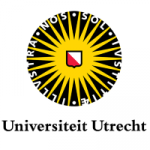 2022 ESIL Annual Conference in Utrecht – The deadline for the Call for Papers is fast approaching… act now!
2022 ESIL Annual Conference in Utrecht – The deadline for the Call for Papers is fast approaching… act now!
The 17th ESIL Annual Conference (1-3 September 2022) will be hosted by Utrecht School of Law in the Netherlands. The Conference will be preceded by Interest Groups’ meetings to be held on 31 August and 1 September. The theme of the Annual Conference is ‘In/Ex-clusiveness of International Law’. While international law’s problematic exclusiveness has been partly remedied, it is often acknowledged that various exclusionary factors are still unresolved, reproduced, or undetected on many fronts. Consider, for instance, representation and participation in the development of law, actors to whom accountability is rendered, the identification of right-holders and protected persons, economic ideologies that underpin law and institutions, and the legal construction of security threats. The conference is designed to foster insightful reflections on the historical, political, and economic baggage of international law. The organising committee members hope that the conference will generate critical, yet forward-looking, discussions among scholars, practitioners, and students.
Please visit the conference website here.
The call for papers is available HERE. The deadline for submissions is 31 January 2022.
 2022 ESIL Research Forum in Glasgow
2022 ESIL Research Forum in Glasgow
The 2022 ESIL Research Forum will take place on 31st March-1st April 2022 at Glasgow. It will be hosted by the Glasgow Centre for International Law and Security (GCILS) at the University of Glasgow. Under the theme of “International Law and Global Security: Regulating an Illusion?”, the Research Forum will address on one of the major themes of 21st century international law. It will look at global security as a dynamic, complex and volatile notion, asking how international law contributes to debates about global security, and how global security concerns shape international law. The Interest Group pre-conference workshops will take place on Wednesday, 30 March 2022.
Further information will be available soon on the dedicated website here. Follow the organisers on Twitter @UofGCILS.
ESIL-CJEU Symposium on “EU Autonomy and International Law”
ESIL is organizing a joint symposium with the Court of Justice of the European Union (CJEU) on the topic “EU Autonomy and International Law“, which will take place on Friday 8 April 2022 in Luxembourg.
Registrations are now open. To register for this event please send an email to events@curia.europa.eu with your name and affiliation. Please indicate whether you will join the seminar online or onsite. For onsite participation you also need to indicate your ID-card/passport number. The deadline for registration is 1 April 2022.
The final programme is now available here.
- The list of all the other ESIL events can be found here.
5. Young ESIL Network
The ESIL Board is delighted to announce the creation of a European and global network of early career international lawyers. The Young ESIL Network will play an active role in the ESIL’s activities and events but also spearhead a number of initiatives specifically of interest to emerging scholars and practitioners with the support of the Society. More info have been sent to all ESIL members via email, if you haven’t received any info and you would like to know more please contact the ESIL Secretariat.
6. ESIL Teaching Corner
As an ESIL member, you have access to the ESIL Teaching Corner, which is an online resource for ESIL members to share syllabi, module outlines, reading lists, and other international law teaching materials and tools.
For more information on the Teaching Corner and how to use it, please visit this page. If you have missed our emails with the Teaching Corner credentials or are a new member and do not know the password yet, please contact esil.secretariat@eui.eu.
The latest additions to the ESIL Teaching Corner include a syllabus of ESIL member Prof. Mando Rachovitsa (University of Groningen) on ‘Dissidence in Leadership’. She agreed to tell us more about her innovative class. Read more here.
The latest uploads are:
- International Investment Law – Prof. Martin Jarrett
- International Dispute Settlement – Dr. Cecily Rose
- Scavenger hunt: ‘Lausanne et le droit international public – Prof. Evelyne Schmid
- Dissidence in Leadership – “What Would Bert Röling Do?” – Dr. Mando Rachovitsa
7. ESIL Lectures
The recording of the latest ESIL Lecture by Prof. Mariano Aznar Gómez, Professor of Public International Law at the Universidad Jaume I in Valencia, on the subject of “Maritime Claims and Underwater Archaeology. When History Meets Politics“ is now available.
The lecture was held at the University of Helsinki on 25 November 2021.
It is now available on the ESIL YouTube channel here.
All previous ESIL Lectures are listed here.
8. ESIL Series
The OUP/ESIL series was established in early 2018, to publish high-quality volumes on the themes of ESIL Annual Conferences and ESIL joint events. In late 2021, in light of progress so far, OUP agreed to extend the cooperation.
So far, five books have been published in the series, most recently The Protection of General Interests in Contemporary International Law, edited by Massimo Iovane, Fulvio M. Palombino, Daniele Amoroso, and Giovanni Zarra (2021), based on papers delivered at the ESILNaples Conference. For a full listing see here.
Two further books are ‘in the pipeline‘: “Attribution, Causality And Evidentiary Rules” (edited by Gabor Kajtar, Basak Çali and Marko Milanovic) and based on an ESIL-ELTE event; and “International Law and Universality” (edited by Jean d‘Aspremont, Iain Scobbie and Isil Aral), which features papers presented at the ESIL Manchester Conference.
If you are interested in putting together a volume for inclusion in the series, please email the General Series Editor, Christian J. Tams (Christian.Tams@glasgow.ac.uk).
9. ESIL Paper Series
The ESIL Paper Series features papers presented at ESIL events (Annual Conferences, Research Forums, and Interest Group events). Publication in the ESIL Paper Series enables authors to disseminate their work widely and reach broader audiences without the usual delays involved in more traditional means of publication. It does not prevent the subsequent publication of papers in academic journals or edited collections.
The current Series editors are ESIL Board members Adriana Di Stefano, Evelyne Schmid and Catharine Titi.
ESIL Papers will be included in the EUI CADMUS Research Repository.
For any enquiries or if you are interested in publishing in the ESIL Papers Series, please send an email to esil.papers@gmail.com.
NOTE: Papers presented at ESIL Conferences from 2011 to 2019 can be downloaded here.
10. ESIL Reflections
ESIL Reflections offer up-to-date reflections on current issues in international law. The Reflections cover a wide range of topics relating to current developments in international law and practice as well as theoretical reflections in a way that is relatively accessible to non-experts. The aim is to foster discussion between ESIL members and international law scholars and practitioners more generally – in Europe, but also beyond. ESIL Reflections are published on this website and distributed freely to ESIL members.
The editors are Federico Casolari, Patrycja Grzebyk, Ellen Hey, Guy Sinclair and Ramses Wessel (editor-in-chief).
ESIL Reflections are short papers (3,000-4,000 words) that argue one particular point that may trigger further debate in the scientific community. Extensive referencing is to be avoided; references are only necessary in case of direct citations or when new or less well-known works are mentioned.
ESIL Members who have an interest in contributing are encouraged to do so. Please contact Ramses Wessel (r.a.wessel@rug.nl) if you would like to contribute.
Copying and reprinting of ESIL Reflections is permitted with due acknowledgement. In such instances, please state: (parts of) this article first appeared as an ESIL Reflection (volume x, issue x), published by the European Society of International Law, www.esil-sedi.eu.
Latest publications are:
- “Between Activism and Complacency, International Law Perspectives on European Climate Litigation” by Lys Kulamadayil
- “The Rise of Nonviolent Protest Movements and the African Union’s Legal Framework” by Florian Kriener and Elizabeth A. Wilson
- “Emotions and International Law” by Anne Saab
11. News from Interest Groups
 ESIL Interest Groups are a vital part of the Society’s success and activities. A list of the groups is available on the ESIL website.
ESIL Interest Groups are a vital part of the Society’s success and activities. A list of the groups is available on the ESIL website.
Interest Group on International Economic Law
In the last months of 2021, the IG IEL (co)organized a number of exciting events: a Roundtable Discussion (“The Historical Turn in International Economic Law” – together with IG HIL), a book symposium (‘The Function of Equity in International Law’) and a book launch (“A Post-WTO International Legal Order: Utopian, Dystopian and Other Scenarios”). We have also launched the call for papers (deadline: 28 January 2022) for the IG IEL workshop that will take place in the context of the 2022 ESIL Research Forum in Glasgow on 30 March 2022. For all our updates check regularly the ESIL IG’s webpage.

